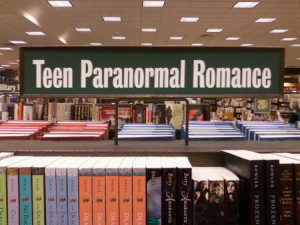 As a writer, I’m constantly embroiled in and barraged by the border-style warfare currently within the publishing industry. From one side, insurgent/terrorist indies fire ebook RPG’s indiscriminately. While from the other side, authorities mount lightning-strike Caterpillar (the big, yellow earth-movers) excursions through the offending shanty towns to demonstrate who is still in control.
As a writer, I’m constantly embroiled in and barraged by the border-style warfare currently within the publishing industry. From one side, insurgent/terrorist indies fire ebook RPG’s indiscriminately. While from the other side, authorities mount lightning-strike Caterpillar (the big, yellow earth-movers) excursions through the offending shanty towns to demonstrate who is still in control.
In the name of full disclosure, I’m an indie. A Browncoat to the core, I just can’t stomach extensive contracts with large corporate entities with the power to put pouty teen girls on my book covers. At the same time, I like to think of myself as a reasonable individual capable of seeing both sides of the war.
In my efforts to do so, I’ve come away repeatedly asking myself the same question.
Do readers even notice or care? Should they?
I’m not sure of the answer to the first question. To the second, the answer is yes.
After all, the battle is one of control. Until recently, the traditional publishers (the most important ones known as “The Big Five” or “formerly known as the Big Six”) maintained most of the control. Writers possessed very little. For the most part, we wrote what publishers wanted (or guessed at it). Readers possessed even less power in my humble opinion. They read what was published and placed on display in retail outlets.
Sure, occasionally a publisher would display a certain title that readers simply wouldn’t stomach. But for the most part, the exposure dictated what readers read and therefore what would sell and therefore what publishers would buy. (Sorta’ circular, ain’t it?)
Now, all of that is changing.
Ebook shelf space is infinite. SEO (led by Amazon’s killbot algorythms) is getting smarter at matching books with readers. Readers have a growing selection of titles to choose from. This gives the reader an increasing amount of power.
But, as the old adage says, “With great power, comes great responsibility.” If readers choose to read Shades of Gray, that is what writers will write (oh, the spineless, commercial groveling of us indies!)
I won’t go so far as to say traditional publishing doesn’t care about the reader. Obviously, they do. I think the industry as a whole tends to get a little snooty about its role in educating readers on what they should want to read. With the great publishing tutor being discredited and disempowered, readers have been loosed to read indiscriminately.
The coming years will be ones of growing pains and maturity for the reader.
In the end, readers will emerge with a newly honed power they’ve never known in publishing. Will it be a spoiled one? Or a disciplined one? Focused? Or scattered? Self-aware? Or oblivious? Just because you can read whatever you want may not mean you should. Or maybe that is exactly the sort of laissez faire attitude the written word desires.
While indies and trads lob blame back and forth for the unsettled state of publishing and the written word, readers should be amassing for a populous uprising. The power is yours for the taking.